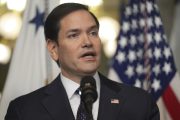
An Idaho city recently agreed to pay $300,000 in damages to three Christians who were arrested for violating its mask order.
On September 23, 2020, Gabriel Rench, Sean Bohnet, and Rachel Bohnet attended an outdoor psalm sing organized by Christ Church of Moscow. Such events were not unusual for the church, but this one was of particular significance. Pursuant to a city ordinance, Moscow’s mayor had issued an emergency order requiring individuals attending both indoor and outdoor events to wear masks and observe social distancing. The Christ Church event was held outside city hall as the city council met to consider extending the mask order.
The psalm sing, plus an unaffiliated nearby protest, failed to sway the council, which extended the order until January 2021.
It succeeded, however, in giving city officials the opportunity to show who was boss. The city painted social-distancing circles in the city-hall parking lot and had police standing by to cite order offenders. Sure enough, five of the nearly 200 worshipers, including Rench and the Bohnets, were arrested for failing to mask or social distance. When they refused to identify themselves, the Bohnets were also charged with resisting or obstructing an officer.
It all seemed pretty cut-and-dried, except for one thing: The ordinance under which the order had been issued explicitly stated,
Unless otherwise specifically prohibited by a Public Health Emergency Order duly enacted by the Mayor, the following activities shall be exempt from the scope of such order: 1. Any and all expressive and associative activity that is protected by the United States and Idaho Constitutions, including speech, press, assembly, and/or religious activity.
Since the order had not “specifically prohibited” such activities, the Christ Church service-cum-protest did not violate it.
In January 2021, under legal pressure from the Thomas More Society, the city, recognizing its error, dropped the charges against the Christians. Rench and the Bohnets, who by then had racked up some serious legal bills, sued the city in federal court, charging it with violating their First and 14th Amendment rights.
The city sought summary judgment in its favor, but in February of this year, U.S. District Judge Morrison England denied the request, lambasting the city both for its treatment of the plaintiffs and for its intelligence-insulting defense of its actions.
Noting that both parties agreed on the facts of the case and that, therefore, the city merely had to prove it was entitled to summary judgment, he wrote in a footnote: “Although the Court cannot remember another case in all of its years on the bench where a moving party established that the material facts were undisputed, but still did not meet its burden of showing it was entitled to judgment, this case shows, as the adage goes, that there is a first time for everything.”
The city based its argument primarily on its contention that the ordinance and order were ambiguous as to whether they applied to the Christ Church event. “That is simply incorrect,” declared England.
The City’s Code could not be more clear: Under a plain reading of the Order in conjunction with the Ordinance, all expressive activity was excluded from the mask or distance mandate because such conduct was not explicitly addressed in the Order itself. In other words, during the relevant time period, those participating in expressive or associative conduct were not required to mask or distance. Plaintiffs should never have been arrested in the first place, and the constitutionality of what the City thought it’s [sic] Code said is irrelevant. Absent violation of the Order or any other law, it is also unclear what justification existed for requiring Plaintiffs to identify themselves or for charging them with obstruction.
Indeed, the judge seemed astonished that “somehow, every single City official involved overlooked the exclusionary language included in the Ordinance.” And he was particularly incensed that when the city presented probable-cause affidavits to a local magistrate judge, the affidavits included only the order, not the ordinance, thereby convincing the magistrate judge to support the plaintiffs’ arrests and citations.
Thus, England denied the city’s request for summary judgment. While he normally would have simply let the parties to the case take things from there, he explained, he instead ordered them to participate in a settlement conference because “this is one of the most novel set[s] of circumstances the Court has ever encountered.”
That conference concluded July 14 with the city’s agreeing to pay the plaintiffs $300,000. That is good news for Rench and the Bohnets but not such good news for their fellow Muscovites, who will have to pay taxes for that settlement on top of all the taxes they’ve had to shell out for everything from social-distancing circles to arrests to the city’s legal expenses.
Rench told CBN that his court victory “reminded everybody that our constitutional rights matter.”
“These public displays of faithfulness really do teach the Church and it also teaches those who brought the injustice on the people,” he said. “It teaches them, ‘Hey, next time the government sees a First Amendment protest they are not going to violate it like they did mine.’”
On the other hand, it may teach them to close loopholes so they can — they hope — get away with violating rights. After the city was forced to drop its charges against the Christians, the city council repealed the section of the ordinance granting automatic exemptions to “expressive and associative activity.”



